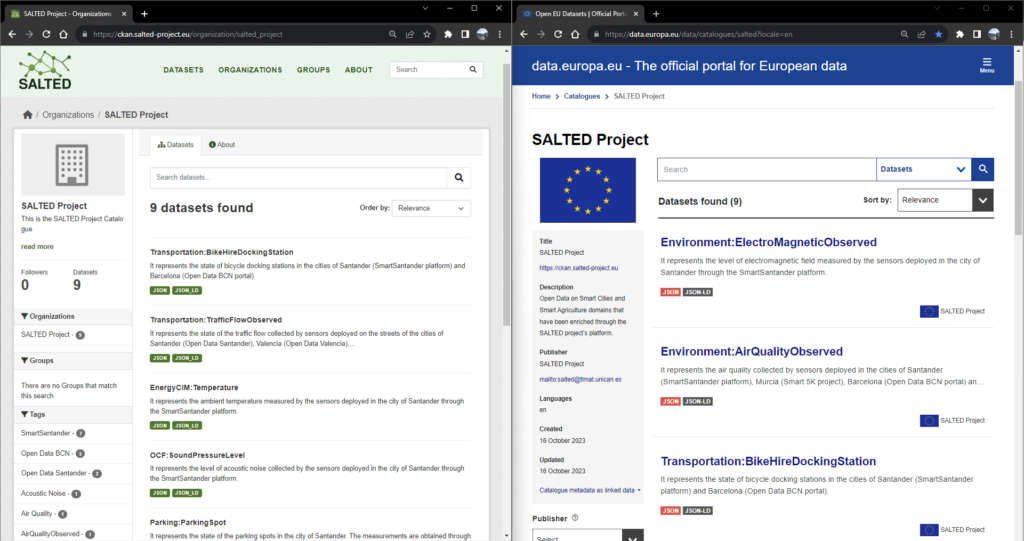
The Open Data paradigm aims to make data available to everyone, without restrictions of copyright, patents or other control mechanisms. The European Data Portal (EDP) is one of the key pillars of Open Data evolution, offering a central portal for the discovery and publication of data within the European Union.
At SALTED, we are delighted to contribute to this approach by publishing our data into the EDP. To this end, we have deployed our own data portal, which provides access to the data generated during the course of the project. Thanks to this portal, the EDP is able to consume our data, promoting its visibility and enabling its usage, thus facilitating the development of innovative services and groundbreaking research.
If you want to check out the types of data that we've been writing about in previous posts, now is finally your time to do so! They are readily available here, as well as in our section inside the EDP.
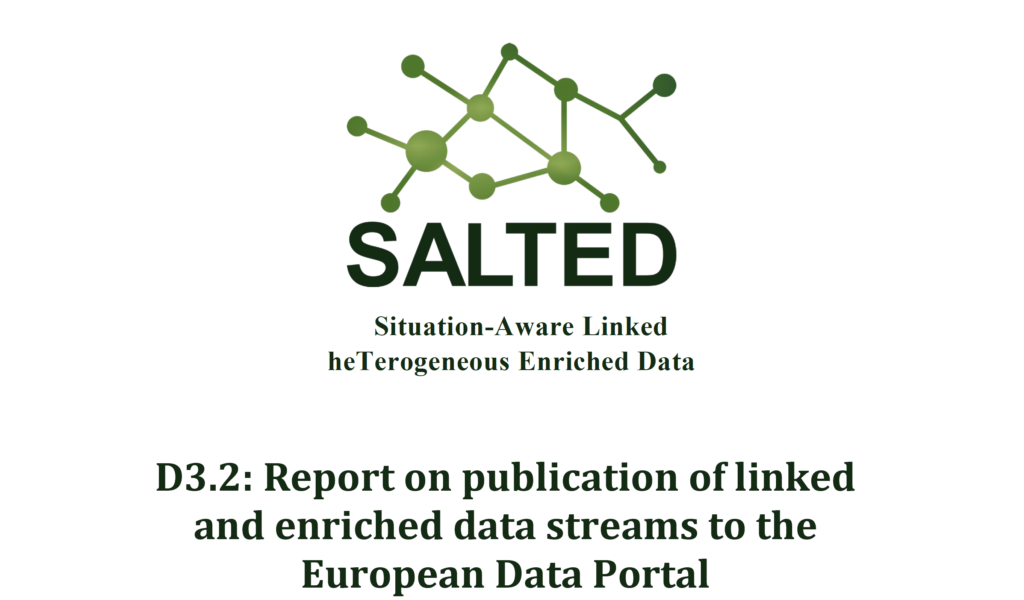
This document, developed by the SALTED project, represents the D3.2 deliverable on the publication of linked and enriched data streams to the European Data Portal. The focus of this document is the description of the last step of the Scorpio Context Broker – CKAN connector regarding the publication of datasets into the EDP. Furthermore, D3.2 includes information on updates to component development since D3.1.
This deliverable, along with the rest of them, can be found in the publications section.
A new paper has been published, featuring the Data Enrichment Toolchain (DET), the system design behind the harmonization and enrichment of highly heterogeneous data sources in SALTED. More details about this paper can be found in the IEEE Access repository; while we reproduce the abstract below.
Abstract: Proliferation of data sources associated to Internet of Things (IoT) deployment as well as those bound to Open Data Portals (e.g. European Data Portal, Municipalities Open Data Portals, etc.) and Social Media platforms is creating an abundance of information that is called to bring benefits for both the private and public sectors, through the development of added-value services, increasing administrations’ transparency and availability or fostering efficiency of public services. However, pieces of information without a context are significantly less valuable. Raw data lacks semantics and it is highly heterogeneous from one data-source to another. This poses a challenge to make it useful. To turn all this data into valuable information it is necessary to enable its combination so that meaningful context can be created. Moreover, it is fundamental to define the mechanisms enabling the adoption and orchestration of advanced (typically AI-enabled) data processing techniques to be applied over the harmonized datasets and data-streams. This paper presents the Data Enrichment Toolchain (DET) that provides the necessary harmonization and enrichment to datasets and data-streams coming from heterogeneous sources. The value of the enriched data lies on the one hand in the transfer of the data into a semantically grounded knowledge graph and, on the other hand, in the creation of new data through linking, aggregating and reasoning on the data. In both cases, the benefit of employing linked-data modelling and semantics comes from the extension of the metadata that is associated to every piece of information. Furthermore, the experimental evaluation of the DET implementation that we have carried out is also presented in the paper.
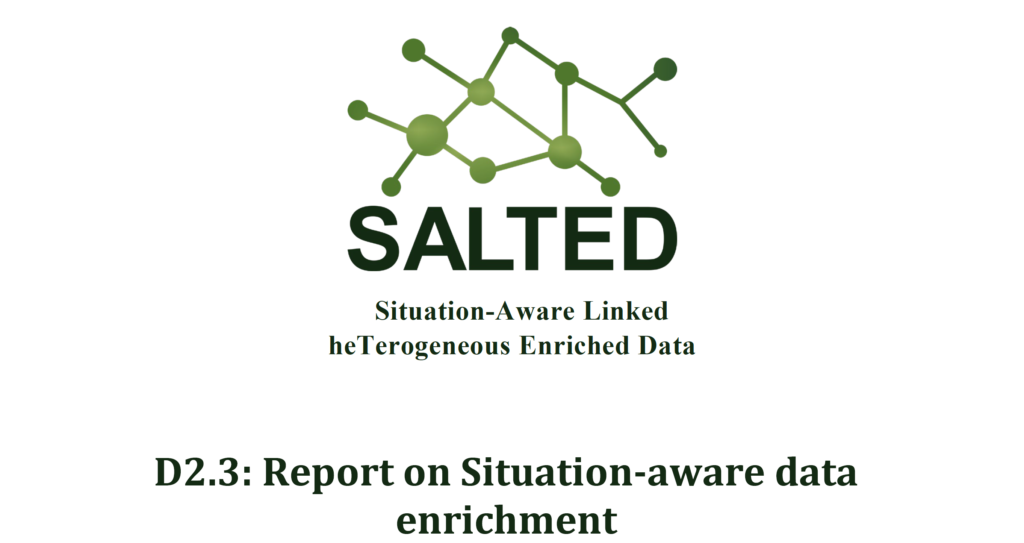
This document, developed by the SALTED project, represents the D2.3 deliverable of the situation-aware data enrichment. The focus of this document is the definition of the architecture implementation and deployment, regarding the enrichment of data that has been carried out throughout the project. The close link to the applications of activity 4 results in a short description of applications as well. Furthermore, D2.3 includes an update on the architecture implementation and deployment reported in deliverables D1, D2.1 and D2.2.
This deliverable, along with the rest of them, can be found in the publications section.

Aligned with the Agenda Analytics use case of the SALTED Project, the development and employment of data services is practically a must when talking about the collection and processing of data stored on the Internet.
Services such as web crawlers or data linkers can be represented by the DataServiceDCAT-AP Smart Data Model, following the principles of linked data, in addition to being fully compliant with the DCAT-AP specification. However, in the project context, certain attributes have been identified for describing these services that were not included in this data model, and thus not included in the DCAT-AP specification.
On the other hand, due to the traceability requirement described in SALTED, it has become essential to describe the different instances of execution of these data services, in order to specify their inputs, configuration parameters and final outputs, among other properties. This evolves into a new data model called DataServiceRun.
Putting these two needs together, our partner Kybeidos has taken these opportunities to extend the DataServiceDCAT-AP data model with these new properties and to contribute to the initiative with the new DataServiceRun model. Both actions will allow the use of the subject that contains them to be more widespread. Moreover, aligned with the agile standardization philosophy of the initiative, they will have higher chances to be submitted to the original standardization group (DCAT-AP) for their adoption.
Both the new data model for DataServiceRun and the extension for the DataServiceDCAT-AP data model can be found in the official Smart Data Models repository: DCAT-AP.
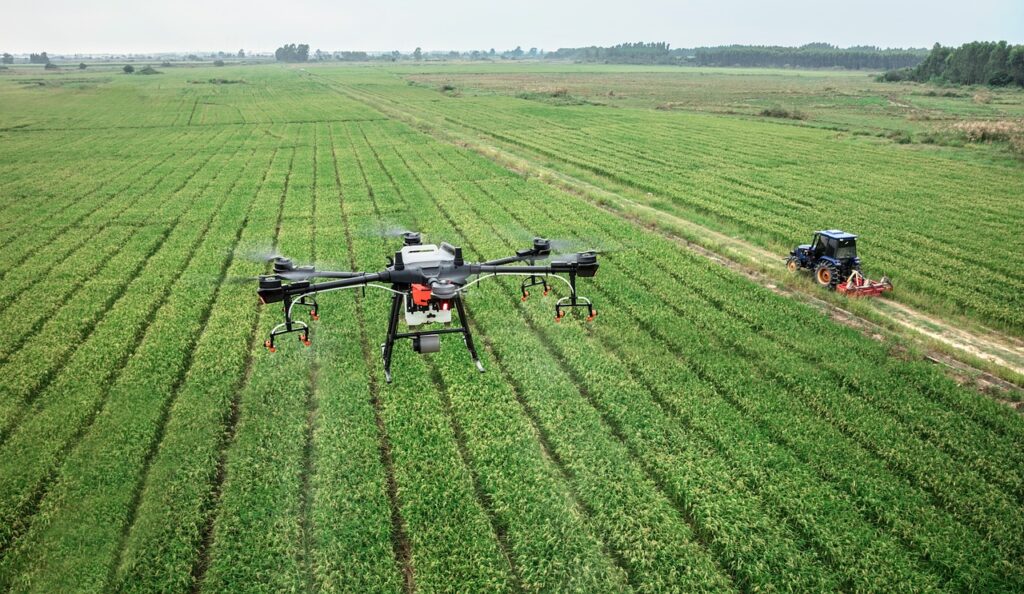
One of the SALTED use cases is Smart Agriculture, which aims to analyse the CO2 levels at several kinds of parcels with different types of soil and/or crops. The parcels used for this assessment are located near the city of Madrid.
Taking advantage of the Smart Data Models initiative, several data models have been chosen for their suitability to the specifics of the Smart Agriculture use case. These are: AgriParcel, to describe the parcels of land; AgriCrop, to describe the crops; and finally, AirQualityObserved, to characterise the levels of CO2 above the parcels assessed. Nevertheless, no relationship between the AgriParcel and AirQualityObserved models existed until now, making the full characterisation of the use case unfeasible.
To address this shortcoming, partners Grupo Amper and Universidad de Cantabria have contributed to the initiative by adding a new relationship (named hasAirQualityObserved) to the AgriParcel data model, linking it to the air quality observations gathered above this parcel, modelled as AirQualityObserved entities. Thanks to the relation between these two models, the main goal of SALTED can be fulfilled: the generation of enriched data which encourage the development of innovative value-added services.
The extension of the data model AgriParcel can be found in the official Smart Data Models repository.
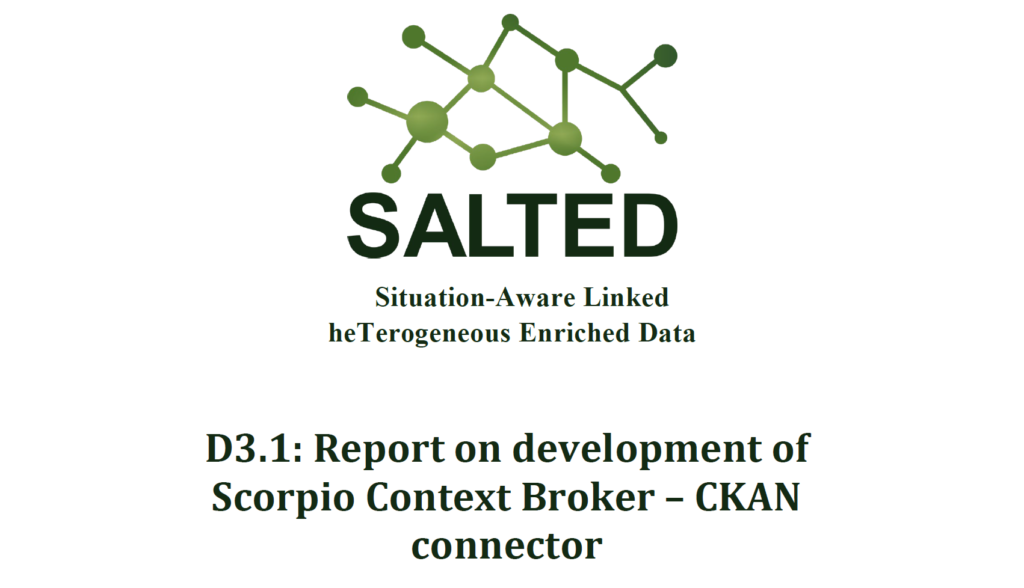
One of the key goals of SALTED is the publication of the NGSI-LD high-value data generated within the project in the European Data Portal (EDP). This document describes the required connectors that interconnect the SALTED architecture to the EDP, by leveraging a Comprehensive Knowledge Archive Network (CKAN) public instance deployed in between.
The document details the implementation and deployment of the concerned connectors, their internal components, and the data models they use. The resulting platform, which includes the Scorpio Broker, the CKAN instance, and the connectors, is aligned with the main output expected from Work Package 3 in general, and Task 3.1 in particular.
The deliverable can be found in the publications section.
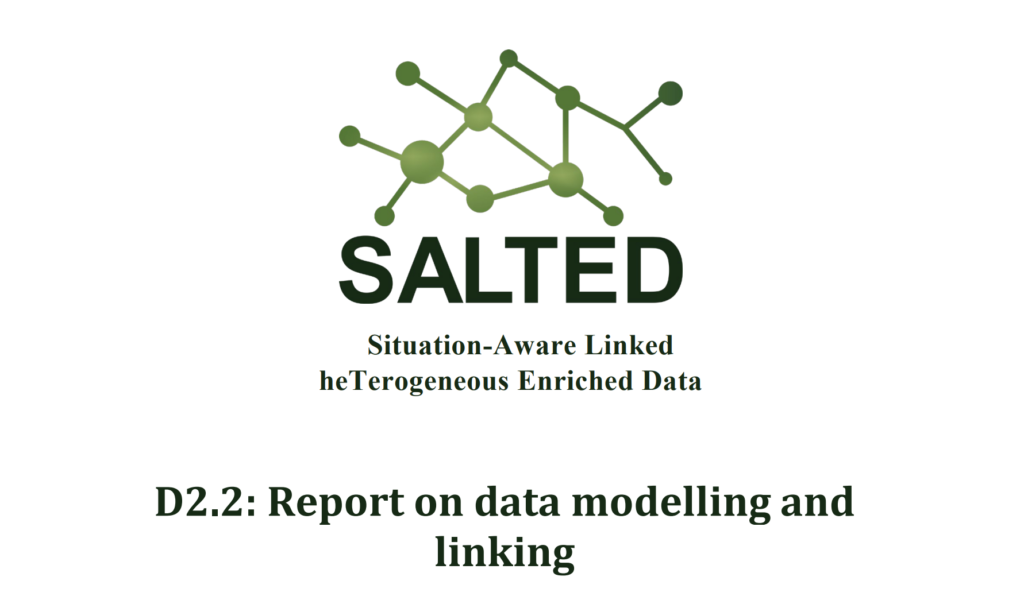
This document represents the D2.2 deliverable of the data modelling and linking. The focus of this document is the thorough definition of the architecture implementation and deployment, including details about how security is handled. Furthermore, D2.2 includes an update on the data modelling introduced in D1 and D2.1, and a review of the linking modules currently implemented.
The deliverable can be found in the publications section of the webpage.
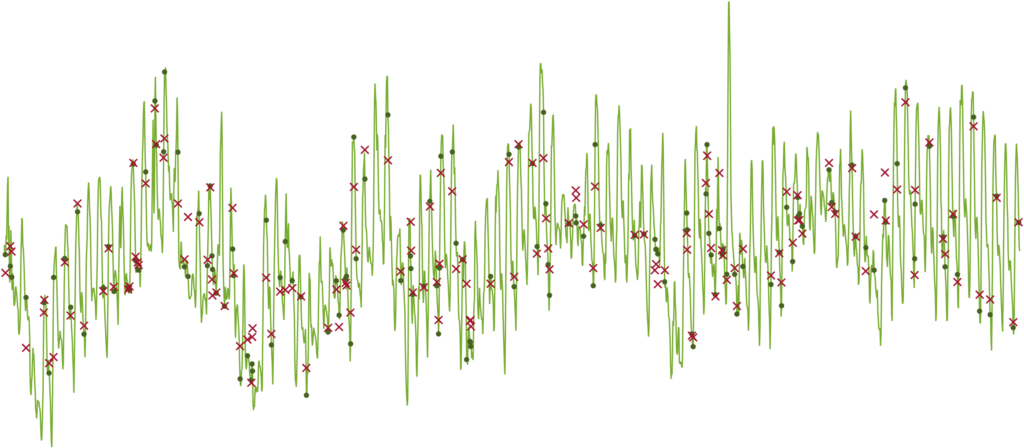
SALTED aims to provide datasets and data-streams enriched with new properties and relationships, facing the need of harmonization of these data. One of the most relevant initiatives pursuing the standardization of data modelling is the Smart Data Models initiative, with more than 800 data models available to use.
Within the SALTED project, our partner Universidad de Cantabria has contributed to the improvement of the Smart Data Models initiative by releasing a new Smart Data Model for the Data Quality Assessment. The main goal of this new Smart Data Model is to characterize the quality properties of several entities or measurements.
The new data model for DataQualityAssessment can be found in the official Smart Data Models repository: DataQuality.
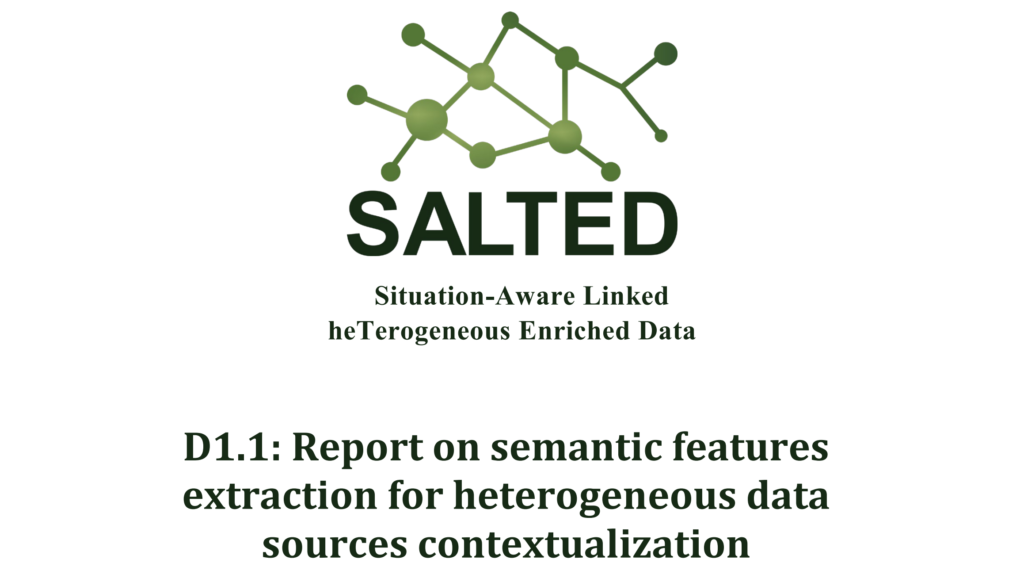
This document represents the D1.1 deliverable of the semantic features extraction for heterogeneous data sources contextualization. The focus of this document is to give an introduction to different data sources used in SALTED as well as smart data models for converting into the NGSI-LD architecture. Furthermore, D1.1 defines the injection chains of different sources and their contributions to the SALTED architecture with a few possible use cases.
This document has a twofold goal: on one side, it is intended for internal use in order to drive the design and implementation of subsequent phases of the DET (i.e. data linking and enrichment toolchain) or application use cases for the project or internally to the partner organizations; on the other hand, it is publicly available in order to increase the awareness of the SALTED activities, its relation with the FIWARE ecosystem and it points to the important issue of the data treatment and consolidation for interoperable applications and domains.
The deliverable can be found in the publications and resources section of the webpage.